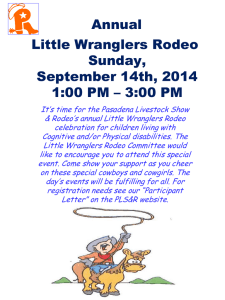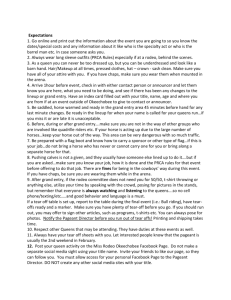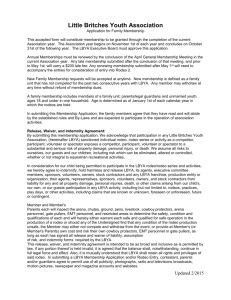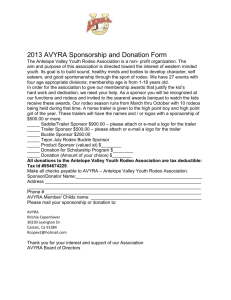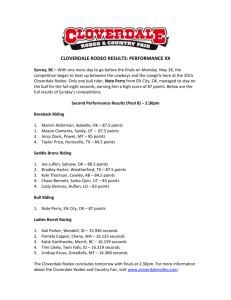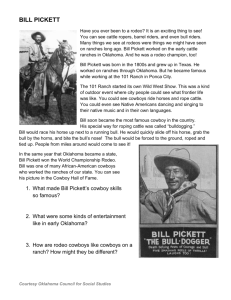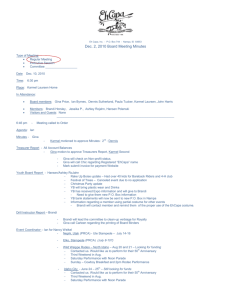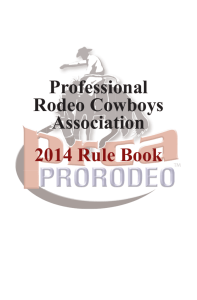The Rodeo Lives On
advertisement
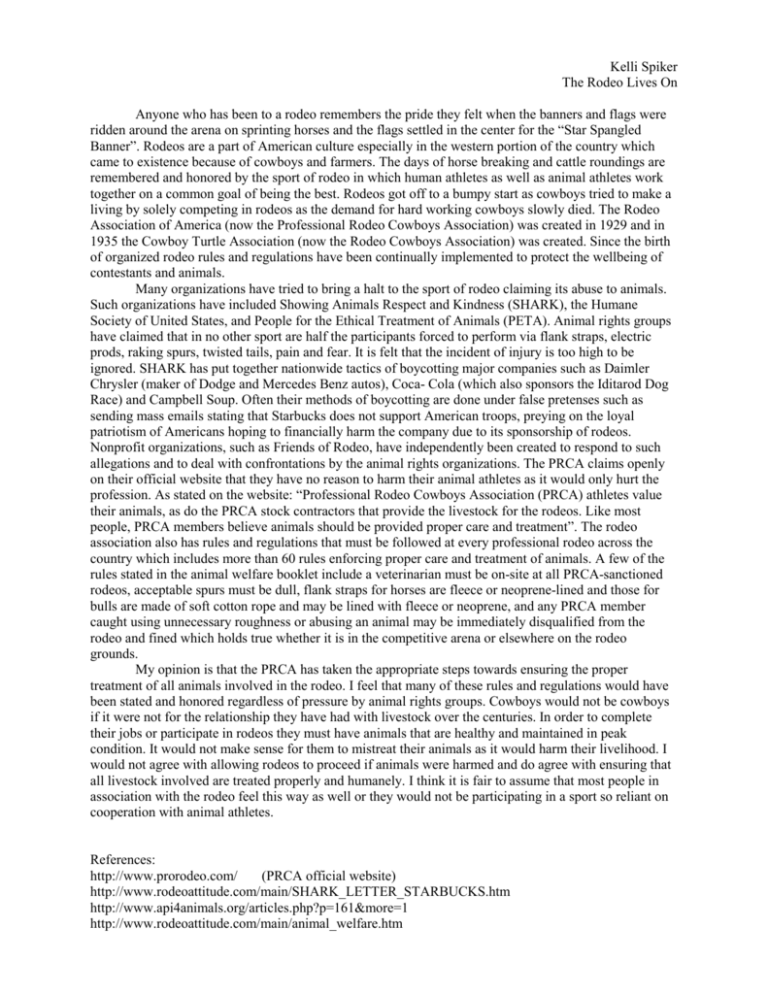
Kelli Spiker The Rodeo Lives On Anyone who has been to a rodeo remembers the pride they felt when the banners and flags were ridden around the arena on sprinting horses and the flags settled in the center for the “Star Spangled Banner”. Rodeos are a part of American culture especially in the western portion of the country which came to existence because of cowboys and farmers. The days of horse breaking and cattle roundings are remembered and honored by the sport of rodeo in which human athletes as well as animal athletes work together on a common goal of being the best. Rodeos got off to a bumpy start as cowboys tried to make a living by solely competing in rodeos as the demand for hard working cowboys slowly died. The Rodeo Association of America (now the Professional Rodeo Cowboys Association) was created in 1929 and in 1935 the Cowboy Turtle Association (now the Rodeo Cowboys Association) was created. Since the birth of organized rodeo rules and regulations have been continually implemented to protect the wellbeing of contestants and animals. Many organizations have tried to bring a halt to the sport of rodeo claiming its abuse to animals. Such organizations have included Showing Animals Respect and Kindness (SHARK), the Humane Society of United States, and People for the Ethical Treatment of Animals (PETA). Animal rights groups have claimed that in no other sport are half the participants forced to perform via flank straps, electric prods, raking spurs, twisted tails, pain and fear. It is felt that the incident of injury is too high to be ignored. SHARK has put together nationwide tactics of boycotting major companies such as Daimler Chrysler (maker of Dodge and Mercedes Benz autos), Coca- Cola (which also sponsors the Iditarod Dog Race) and Campbell Soup. Often their methods of boycotting are done under false pretenses such as sending mass emails stating that Starbucks does not support American troops, preying on the loyal patriotism of Americans hoping to financially harm the company due to its sponsorship of rodeos. Nonprofit organizations, such as Friends of Rodeo, have independently been created to respond to such allegations and to deal with confrontations by the animal rights organizations. The PRCA claims openly on their official website that they have no reason to harm their animal athletes as it would only hurt the profession. As stated on the website: “Professional Rodeo Cowboys Association (PRCA) athletes value their animals, as do the PRCA stock contractors that provide the livestock for the rodeos. Like most people, PRCA members believe animals should be provided proper care and treatment”. The rodeo association also has rules and regulations that must be followed at every professional rodeo across the country which includes more than 60 rules enforcing proper care and treatment of animals. A few of the rules stated in the animal welfare booklet include a veterinarian must be on-site at all PRCA-sanctioned rodeos, acceptable spurs must be dull, flank straps for horses are fleece or neoprene-lined and those for bulls are made of soft cotton rope and may be lined with fleece or neoprene, and any PRCA member caught using unnecessary roughness or abusing an animal may be immediately disqualified from the rodeo and fined which holds true whether it is in the competitive arena or elsewhere on the rodeo grounds. My opinion is that the PRCA has taken the appropriate steps towards ensuring the proper treatment of all animals involved in the rodeo. I feel that many of these rules and regulations would have been stated and honored regardless of pressure by animal rights groups. Cowboys would not be cowboys if it were not for the relationship they have had with livestock over the centuries. In order to complete their jobs or participate in rodeos they must have animals that are healthy and maintained in peak condition. It would not make sense for them to mistreat their animals as it would harm their livelihood. I would not agree with allowing rodeos to proceed if animals were harmed and do agree with ensuring that all livestock involved are treated properly and humanely. I think it is fair to assume that most people in association with the rodeo feel this way as well or they would not be participating in a sport so reliant on cooperation with animal athletes. References: http://www.prorodeo.com/ (PRCA official website) http://www.rodeoattitude.com/main/SHARK_LETTER_STARBUCKS.htm http://www.api4animals.org/articles.php?p=161&more=1 http://www.rodeoattitude.com/main/animal_welfare.htm
